HCRN study combines bone-targeting drug with androgen deprivation therapy for metastatic prostate cancer

Hoosier Cancer Research Network (HCRN) announces the launch of a cancer clinical trial for subjects with newly diagnosed metastatic prostate cancer with bone metastases. The study, known as GU13-170, will compare the good and bad effects of adding Radium-223 dichloride, a bone-targeted drug, to androgen deprivation therapy, the usual treatment for this type of cancer. […]
New study evaluates efficacy of immunotherapy drug in treatment of incurable germ cell tumors

Hoosier Cancer Research Network (HCRN) recently launched a cancer clinical trial evaluating the efficacy of the PDL-1 inhibiting drug pembrolizumab in the treatment of patients with incurable platinum refractory germ cell tumors. The study, known as HCRN GU14-206, is now open to accrual at the Indiana University Melvin and Bren Simon Cancer Center. This is […]
Four HCRN studies accepted to ASCO 2016

Abstracts from four Hoosier Cancer Research Network studies were accepted to the American Society of Clinical Oncology (ASCO) 2016 Annual Meeting, June 3-7 at the McCormick Place in Chicago. The studies include GU12-157 (poster session), GU14-188 (poster session), GU14-202 (poster session), and LUN14-179 (publication-only abstract).
Focus on Research Scholar Program 2016
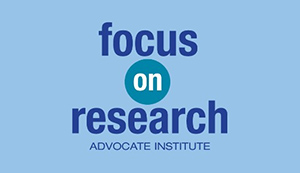
Research Advocacy Network is now accepting applications for the 2016 Focus on Research Scholar Program. It is a time in cancer research for advocates to be prepared for opportunities to represent the patient voice. The Focus on Research Scholar Program is an excellent preparation or refresher to improve knowledge and skills. Research Advocacy Network has some exciting plans […]
Reps for Research: Raising the bar in the fight against cancer

Hoosier Cancer Research Network Chairman Christopher A. Fausel, PharmD, has again and again raised the bar in the fight against cancer – literally. This spring, he reissued his unique challenge to friends and supporters of HCRN: the Reps for Research challenge. Combining his interest in strength training and his passion for investigator-initiated research, Fausel invited […]
Flores finds oncology a bridge between basic and clinical research

“For a long time, I think we’ve tended to treat these two spaces separately, the basic science space and then the clinical space,” said John Paul Flores, MD, fellow at the Tufts University School of Medicine. Keenly aware of the relationship between patient care and basic science, Flores found in oncology a profound union of […]
Intellectual curiosity a driving force for Hirva Mamdani
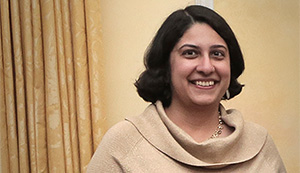
Hirva Mamdani, MD, embodies one of the most powerful, human forces in the fight against cancer: curiosity. Her inquisitive nature surfaced early in the fertile soil of her upbringing. “I grew up in a family of physicians, so I always saw my dad and siblings working very hard, taking care of patients, and making them […]
Regulatory affairs a rewarding career for Towler
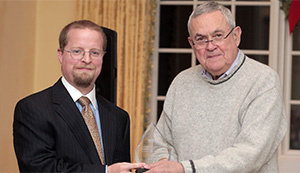
A native Hoosier, William Ian Towler is the Regulatory Manager for the Indiana University Melvin and Bren Simon Cancer Center. “My job is to make sure we function as smoothly as possible,” Towler says. [Photo: Ian Towler (left) and HCRN co-founder and William B. Fisher, MD.] The breadth of Towler’s impact is as wide as his […]
HCRN opens clinical trial for subjects with metastatic castrate-resistant prostate cancer

Hoosier Cancer Research Network is pleased to announce the opening of a cancer clinical trial for subjects with metastatic castrate-resistant prostate cancer at select sites throughout the United States. The study, known as GU14-202, is designed to assess the safety and toxicity of an investigational drug called niraparib, a poly (ADP-ribose) polymerase (PARP) inhibitor, given […]
HCRN study compares pembrolizumab to placebo as maintenance therapy in metastatic bladder cancer

A new Hoosier Cancer Research Network study is exploring the effects of pembrolizumab in treating metastatic urothelial cancer. The study, known as GU14-182, will compare maintenance pembrolizumab to a placebo in subjects after first-line chemotherapy for metastatic urothelial cancer (e.g., cancer of the bladder, urethra, ureter, or renal pelvis). The study is currently open to […]
Fausel invites “Reps for Research” pledges

Hoosier Cancer Research Network chairman Christopher A. Fausel, PharmD, is once again combining his passion for investigator-initiated research with his annual participation in the Arnold Sports Festival Pump & Run 5K in Columbus, Ohio. Fausel has participated in the annual strength and endurance event for several years, and is inviting pledges in support of Hoosier […]
A BCAN of hope in the darkness of cancer
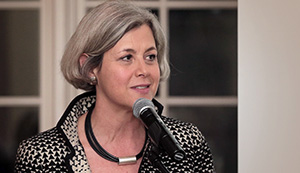
In the dark world of cancer, there are those who shine like bright beacons of hope and guidance for many. Hoosier Cancer Research Network (HCRN) annually recognizes the role that spirited patient advocates and champions of oncological progress fill through the Terry Hoeppner Patient Advocacy Award, named in memory of beloved Indiana University football coach […]
Galsky presents oral abstract on GU10-148

In an oral abstract session at the 2016 Genitourinary Cancers Symposium, Matthew Galsky, MD, reported on the HCRN GU10-148 study, a phase II trial of gemcitabine and cisplatin plus ipilimumab as first-line treatment for patients with metastatic urothelial carcinoma. Dr. Galsky (pictured), of the Tisch Cancer Institute, Icahn School of Medicine at Mount Sinai, is […]
Glick brings first-hand experience to behind-the-scenes work

Around six years ago, Stephen Glick was a businessman, a manager of supply chains in manufacturing. Today, he is a regulatory affairs specialist at IU Health Goshen Center for Cancer Care. His personal journey from one professional world to the next is the story of compassion forging sustained professional commitment that contributes to progress in […]
Investigators report on QL12-153 study
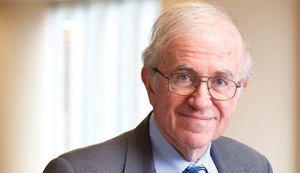
In a new journal article published online ahead of print in Supportive Care in Cancer, Hoosier Cancer Research Network investigators reported on results of QL12-153, a phase II study of fosaprepitant + 5HT3 receptor agonist + dexamethasone in patients with germ cell tumors undergoing 5-day cisplatin-based chemotherapy. The multi-center study was led by sponsor investigator […]
HCRN study combines immunotherapy and chemotherapy in advanced colorectal cancer

Hoosier Cancer Research Network recently opened a cancer clinical trial for subjects with advanced colorectal cancer. The study, known as GI14-186, involves the study drug called pembrolizumab, given in combination with mFOLFOX6, a standard chemotherapy regimen for advanced colorectal cancer. The study is currently open to accrual at the Indiana University Melvin and Bren Simon […]
HCRN forms new working group for symptom management

Hoosier Cancer Research Network recently launched a Symptom Management Clinical Trial Working Group. The group grew out of a desire to see improvements in quality of life for patients, from diagnosis through survivorship. Formation of the group was sparked by Julie Otte, PhD, RN, OCN from the Indiana University School of Nursing and her commitment […]
Danielson award winner Rahma exploring immunotherapy in GI cancers

In 2009, Osama Rahma, MD, was settling in to the National Institutes of Health as part of a team that focused on the development of cancer vaccines and the emerging field of cancer immunotherapy. It was a time when the interaction between the immune system and cancer cells was just starting to become clear. “We […]
Zon, Hussain nominated for ASCO leadership roles

Former Hoosier Cancer Research Network vice chair Robin T. Zon, MD, FACP, FASCO, has been selected by the American Society of Clinical Oncology (ASCO) Nominating Committee as a candidate for president-elect. Dr. Zon (pictured left) is a vice president and senior partner at Michiana Hematology-Oncology, P.C. She served as HCRN vice chair from 2006 to […]
OncoGenex announces completion of enrollment for Borealis-2
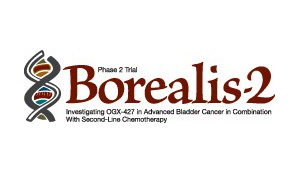
OncoGenex Pharmaceuticals, Inc., recently announced that Borealis-2™, an investigator-sponsored, randomized Phase 2 trial, has met its target enrollment of 200 patients. Designed to evaluate apatorsen in combination with docetaxel in patients with advanced or metastatic bladder cancer who have disease progression following first-line platinum-based chemotherapy, Borealis-2 is managed by Hoosier Cancer Research Network and is […]
GU07-122 bladder cancer study published in Urologic Oncology
A new journal article on Hoosier Cancer Research Network’s GU07-122 study will appear in the October 2015 issue of Urologic Oncology. The study was designed to determine feasibility and safety of treatment with dasatinib administered orally once daily for 4 weeks duration prior to radical cystectomy for urothelial carcinoma of the bladder.
Genomic profiling study brings personalized medicine to metastatic bladder cancer patients
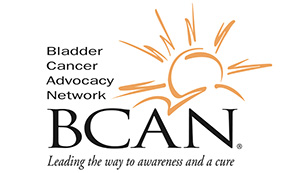
The Bladder Cancer Advocacy Network (BCAN) and Paradigm today announced a partnership for the launch of a large-scale genomically-driven bladder cancer study. Hoosier Cancer Research Network (HCRN) will act as the coordinating center. This prospective study is the first project of the Bladder Cancer Genomics Consortium (BCGC), a collaborative effort between BCAN and major medical […]
Long-time HCRN member McClean retires

More than 30 years ago, a group of academic and community physicians in Indiana launched the Hoosier Oncology Group (or the “HOG”) as a new model for academic and community collaboration in clinical cancer research. John McClean, MD, a medical oncologist in Galesburg, Ill., was one of the earliest and most enthusiastic community physicians to […]
VFW Auxiliary donates $14,500 to HCRN
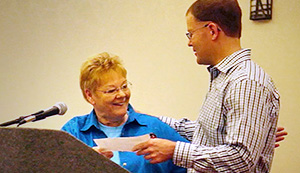
The Indiana Department of the Veterans of Foreign Wars Auxiliary (formerly known as the Ladies Auxiliary to the VFW) recently donated more than $14,500 to Hoosier Cancer Research Network. The generous gift is just one example of the VFW Auxiliary’s long-standing support for cancer research. For more than 100 years, the VFW Auxiliary has served […]
Courage to Climb 2015 to benefit HCRN

Columbus North High School in Columbus, Ind., will host the 2015 Courage to Climb concert on Saturday, Aug. 15, at 7:00 p.m. in the high school’s Erne Auditorium. The annual benefit concert — tickets are $15 at the door — honors Columbus North choir director and cancer survivor Janie Gordon. Diagnosed with breast cancer in […]
Chiorean exploring targeted therapies in GI cancers

Those who follow the trends in modern cancer research know we have entered a new era of discovery. The old strategy of indiscriminately attacking the body to rid it of cancerous cells is giving way to more targeted approaches to treating disease. E. Gabriela Chiorean, MD, associate professor of medicine at the University of Washington […]
Moore joins HCRN Board of Directors

Hoosier Cancer Research Network, a nonprofit cancer research organization in Indianapolis, recently welcomed Annette Moore, MD, as a member of its board of directors. A medical oncologist/hematologist at Community Howard Regional Health in Kokomo, Ind., Moore earned her medical degree from the University of Mississippi and completed her internal medicine residency and fellowship in hematology/oncology […]
Give in Memory of Joseph Patrick Breen
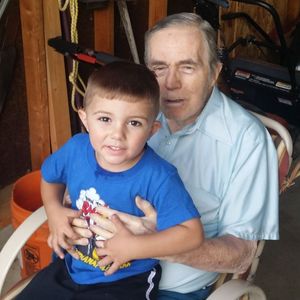
Hoosier Cancer Research Network is accepting donations in memory of Joseph Patrick Breen, who died Sunday, May 31, 2015, at the age of 87. Give in memory of Joseph Patrick Breen. Breen was born in Indianapolis on February 25, 1928 to John F. and Nora C. (Mulrine) Breen. Joseph was a 1947 graduate of Howe […]
Four abstracts accepted to ASCO 2015
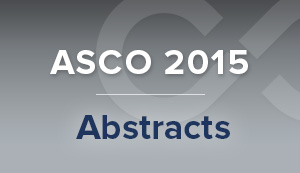
Abstracts from four Hoosier Cancer Research Network studies have been accepted by the American Society of Clinical Oncology (ASCO) for the 2015 Annual Meeting in Chicago on May 29 – June 2. The studies include GU10-148 (poster discussion), BRE09-146 (poster), GI05-102 (poster), and QL12-153 (publication-only abstract).
Zellars joins HCRN Board of Directors

Hoosier Cancer Research Network recently welcomed Richard C. Zellars, MD, as a member of the Board of Directors. Dr. Zellars joined the Indiana University School of Medicine in January as professor and chair of radiation oncology, and is a researcher at the IU Simon Cancer Center. Prior to this, he was associate professor of radiation […]
Reps for Research donations to support lung cancer research

This spring, Hoosier Cancer Research Network Chairman Christopher A. Fausel, PharmD, offered a unique challenge to friends and supporters of HCRN. Combining his interest in strength training and his passion for investigator-initiated research, Fausel invited pledges for every bench-press “rep” he could complete at the Arnold Sports Festival’s 5K Pump and Run event in Columbus, […]
RAN seeking lung cancer survivors for survey
The Research Advocacy Network is seeking lung cancer survivors who have received chemotherapy to share their experience about certain side effects in an online survey. Individuals diagnosed with lung cancer who have received chemotherapy are invited to begin the survey at http://bit.ly/1yXAfFr. Participants will first be asked about certain characteristics of their experience. Participants who […]
HCRN remembers Donald C. “Danny” Danielson
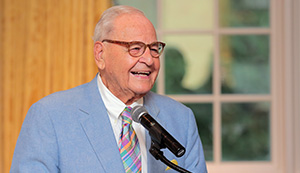
Hoosier Cancer Research Network mourns the loss of Donald C. “Danny” Danielson, who died this morning at his home in New Castle, Ind., at the age of 95. “Danny Danielson was a remarkable man whose visionary leadership transformed organizations in the State of Indiana and beyond,” said HCRN Chairman Christopher A. Fausel, PharmD. “We are […]
Fisher Award recipient explores immunotherapy targets in circulating tumor cells

Gregory A. Durm, MD, a hematology/oncology fellow at the Indiana University School of Medicine, is helping to break new ground in the fight against cancer by studying circulating tumor cells (CTCs) in lung cancer. CTCs are cells that have broken away from primary tumors and have entered into the bloodstream. CTCs that survive the bloodstream’s […]
HCRN opens PD-1 inhibitor trial for non-small cell lung cancer

Hoosier Cancer Research Network is pleased to announce the opening of a cancer clinical trial for patients with stage III non-small cell lung cancer at select sites throughout the United States. The study, known as LUN14-179, seeks to determine if the use of an investigational drug, Pembrolizumab, following standard chemoradiation treatment, improves the time to […]
Open house highlights
Hoosier Cancer Research Network welcomed new and familiar faces during an open house on Thursday, January 22, at the company’s new offices at 500 N. Meridian Street in Indianapolis. The new facility brings together all departments of the organization, and includes several offices, conference rooms, a board room, a protocol development room, and a biorepository […]
HCRN honors investigators with awards

Hoosier Cancer Research Network recently honored two investigators with awards for their contributions to clinical cancer research. Gabriela Chiorean, MD, received the 2014 Danny Danielson Translational Innovation Award. The award was created in 2013 by Donald C. “Danny” Danielson and is granted twice each year through the Walther Cancer Foundation to investigators working in partnership […]
2014 Highlights: Chairman of the Board

2014 was a year of rapid fire change and accomplishment for the Hoosier Cancer Research Network (HCRN). It’s all in a name … the Hoosier Oncology Group Board of Directors voted to change the name of the organization to the Hoosier Cancer Research Network in the spring of 2014. The decision was based on the […]
2014 Highlights: Chief Scientific Officer

As I reflect on what we have accomplished during the past year, let me say how much I have enjoyed my new position as chief scientific officer of Hoosier Cancer Research Network. Getting to know the leadership and the staff has been a wonderful experience, and I have been very impressed with how HCRN operates. […]
HCRN chairman invites “Reps for Research” pledges

Hoosier Cancer Research Network chairman Christopher A. Fausel, PharmD, is putting his “rep” on the line March 8 at the Arnold Sports Festival 2015 Pump & Run 5K in Columbus, Ohio. Fausel has participated in the annual strength and endurance event in the past, but this year is raising the bar(bells) by inviting pledges in […]
Pennington retires after 34 years in medical oncology
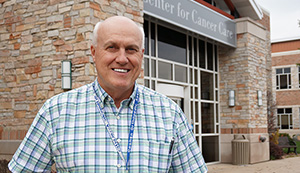
Hoosier Cancer Research Network co-founder Kenneth L. Pennington, MD, recently retired from the IU Health Goshen Center for Cancer Care after 34 years of practice in medical oncology. As a founding member of HCRN (formerly known as Hoosier Oncology Group), Dr. Pennington shared the vision to bring innovative cancer research to communities throughout Indiana and […]
HCRN closed on Martin Luther King, Jr. Day
The Hoosier Cancer Research Network administrative office will be closed Monday, January 19, in observance of Martin Luther King, Jr. Day. The office will re-open on Tuesday, January 20 at 8 a.m. ET.
HCRN holiday hours

The Hoosier Cancer Research Network administrative office will be closed beginning Wednesday, December 24 through Friday, December 26 in observance of the Christmas holiday. The office will re-open on Monday, December 29 at 8 a.m. ET. In addition, the office will be closed on Thursday, January 1, in observance of the New Year’s holiday. The […]
Francis brings compassion, humor to patient care
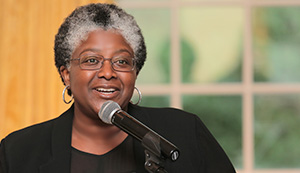
Whatever each day brings, no matter how she feels at any given moment, Deneise Francis, RN, BSN, OCN, CCRP, always brings a smile and a sense of humor to the patients under her care. Compelled by compassion and an awareness that “my problems are nothing compared to theirs,” she strives to be fully present with […]
Einhorn reflects on milestone anniversaries
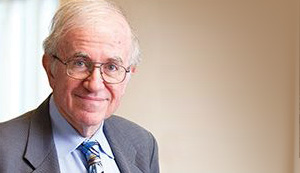
As Hoosier Cancer Research Network celebrates our 30th anniversary, we acknowledge another significant milestone: the 40th anniversary of the discovery of the cure for testicular cancer by HCRN co-founder and board member, Lawrence H. Einhorn, MD. Dr. Einhorn joined the Indiana University School of Medicine in 1973, just one year before his groundbreaking discovery testing […]
Caring comes naturally for Turner Award winner Pierce

From an early age, Gladys Pierce, RN, OCN, knew she was destined for a career in nursing. She wanted to help people, and volunteered at a nursing home during high school. More than 40 years later, Pierce remains as committed as ever to providing care in her role as nurse coordinator for the Oncology Research […]
Ladies Auxiliary to the VFW donates $12,500 to HCRN
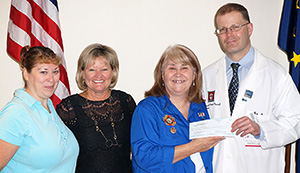
The Indiana Department of the Ladies Auxiliary to the Veterans of Foreign Wars recently donated nearly $12,500 to Hoosier Cancer Research Network (formerly known as Hoosier Oncology Group). The generous gift is just one example of the Ladies Auxiliary’s long-standing support for cancer research. For 100 years, the Ladies Auxiliary to the VFW has served […]
Galsky receives Danny Danielson Translational Innovation Award

Hoosier Cancer Research Network, formerly known as Hoosier Oncology Group, recently honored Matthew Galsky, MD, as recipient of the Danny Danielson Translational Innovation Award. The $10,000 award, granted by the Walther Cancer Foundation through the generous support of business and civic leader Donald C. “Danny” Danielson, is given twice each year to investigators working in […]
Matei receives Fisher Young Investigator Award
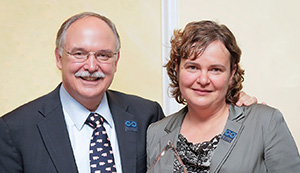
Hoosier Cancer Research Network, formerly known as Hoosier Oncology Group, recently honored Daniela Matei, MD, as the 2014 recipient of the George and Sarah Jane Fisher Young Investigator Award. Dr. Matei received her medical degree in her native Romania before moving to the United States and completed her residency at SUNY at Stony Brook, NY, […]
Matei receives 2011 Research Frontiers Trailblazer Award
Dr. Daniela Matei received the Research Frontiers Trailblazer Award for her discoveries related to the biology of ovarian cancer at the second annual Research Day conference. The Trailblazer award honors outstanding IUPUI researchers who are “showing great promise in becoming nationally and internationally known for their accomplishments in advancing the frontiers of knowledge.”

